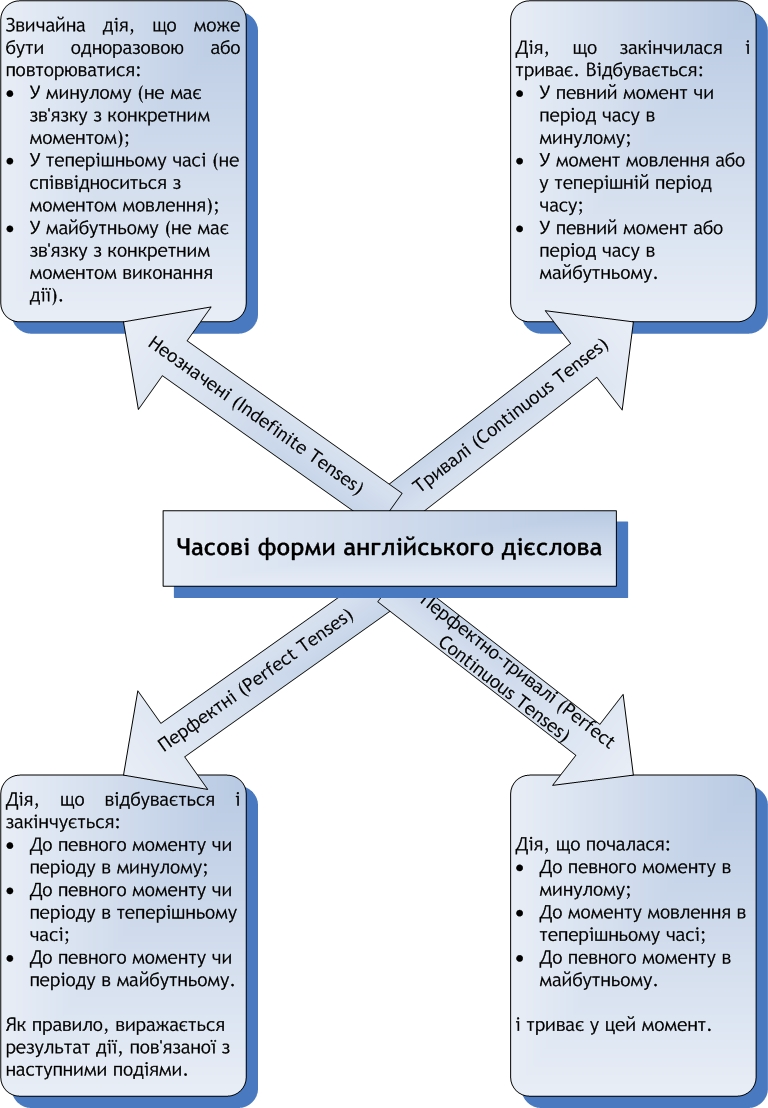
- •III Змістовий модуль
- •Great Britain
- •Interrogative Pronouns
- •Indefinite Pronouns
- •Intensive Pronouns
- •British Educational System
- •Vocabulary
- •American System of Education
- •Будова стверджувальних, заперечних, питальних речень
- •Практичне заняття № 3
- •The Discovery of America
- •Vocabulary:
- •The us Government
- •Vocabulary:
- •British Traditions and Customs
- •Vocabulary:
- •Holidays in the usa
- •Модуль самостійної роботи
- •"Unwritten Rules" of Great Britain
- •The Superstitions in Britain
- •American Symbols
- •Література
- •Робота над текстами за професінйим спрямуванням:
- •Music in Our Life
- •Vocabulary:
- •My Favourite English Painter
- •Vocabulary:
- •Theatre
- •Vocabulary:
- •What Is Modern Dance?
- •Робота над текстами за професійним спрямуванням:
- •Top List of Best Songs
- •The Hermitage
- •Vocabulary:
- •Vincent Van Gogh
- •Vocabulary:
Будова стверджувальних, заперечних, питальних речень
Present Indefinite вживається для вираження дії, яка характеризує підмет постійно або протягом теперішнього періоду часу:
You shoot very well. – Ви стріляєте дуже добре.
He dances very badly. – Він танцює дуже погано.
Present Indefinite вживається для вираження дії або стану, які НЕ обмежені якимись часовими рамками і відбуваються незалежно від волі людини:
Sugar dissolves in water. – Цукор розчиняється у воді.
Copper conducts electricity. – Мідь проводить електрику.
Present Indefinite вживається для вираження дії, яка відбувається в момент мовлення:
З дієсловами, що НЕ вживаються у формі Continuous:
to see;
to know;
to hear;
to feel;
to like;
to hate;
to love;
to understand.
I don’t see anything. – Я нічого не бачу.
I don’t understand it. – Я не розумію цього.
Якщо той, хто говорить, лише констатує факт, а не передає дію як процес, що триває:
Here she comes. – Ось вона йде.
Why does she walk so slow? – Чому вона йде так повільно.
Present Indefinite вживається для вираження майбутньої дії в підрядних реченнях часу та умови, які вводяться сполучниками:
when- коли;
after– після того як;
before– перш ніж;
till, until– поки;
as soon as – як тільки;
if– якщо;
unless– якщо не;
та інші.
Present Indefinite вживається для вираження запланованої майбутньої дії (здебільшого з дієсловами, що означають рух: to go– іти; to come– приходити; to leave– від’їжджати; to start– вирушати, та інші). У таких реченнях звичайно вживаються обставинні слова, що вказують на час дії. У відповідних українських реченнях вживається теперішній час:
I leave Kyiv tomorrow. – Завтра я виїжджаю з Києва.
Present Indefinite вживається у зв’язній розповіді для вираження дії або ряду послідовних дій у минулому. Таке вживання PresentIndefiniteпожвавлює розповідь, події ніби відбуваються в момент мовлення:
All of a sudden, one evening comes little Emily from her work and him with her. – Раптом, одного вечора приходить Емілі з роботи і він з нею.
Вправи до виконання.
Ex. 1. Expand the following into sentences in order to make true statements with doesn't or don't where necessary
water/ boil/at 100"C Water boils at 1OO°C.
rice / grow / on trees
Rice doesn't grow on trees.
chicks / hatch / from eggs
kangaroos / live / in Spain
plants / need / water to grow
rain / fall / from clouds
astronauts / travel / in submarines
cows / lay / eggs
pandas / live / in Italy
elephants / eat / meat
fish / walk / on land
the sun / set / in the east
bees / give milk
caterpillars / turn / into butterflies
wool / come / from sheep
Ex. 2. In pairs, ask and answer questions using the prompts below, as in the example.
SA: Do you often go to the cinema?
SB: Yes, I do. I usually go to the cinema at the weekend.
1. go to the cinema
2. buy magazines
3. watch quiz shows
4. listen to the radio
5. phone your friends
6. play computer games
Ex. 3. Complete the sentences by putting in the verbs. Use the Present Simple. You have to decide if the verb is positive or negative.
Claire is very sociable. She knows. (know) lots of people.
We've got plenty of chairs, thanks. We don’t want (want) any more.
1. My friend is finding life in Paris a bit difficult. He.............................................(speak) French.
2. Most students live quite close to the college, so they.............................................(walk) there.
3. My sports kit is really muddy. This shirt.............................................(need) a good wash.
4. I've got four cats and two dogs. I.............................................(love) animals.
5. No breakfast for Mark, thanks. He.............................................(eat) breakfast.
6. What's the matter? You.............................................(look) very happy.
7. Don't try to ring the bell. It.............................................(work).
8. I hate telephone answering machines. I just.............................................(like) talking to them.

